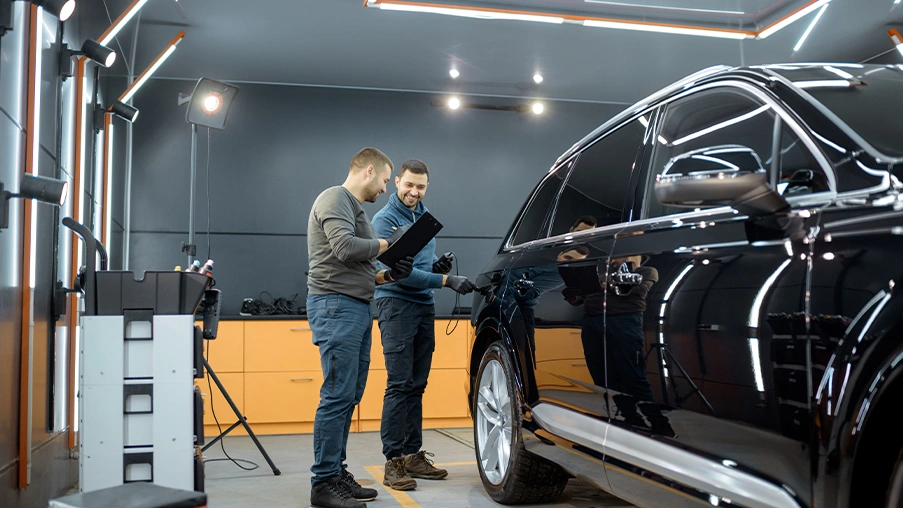In order to keep drivers safer on the road, advanced driver assistance systems, or ADAS, have become an essential component of contemporary automobiles. These technologies, which include adaptive cruise control and lane-keeping assistance, mostly depend on accurate calibration. It’s time to get your ADAS recalibrated if your car has recently been in an accident, had its windshield replaced, or had suspension work done. And this is where a certified ADAS shop Los Angeles can truly help—accuracy counts, and not all establishments are capable of meeting the standards.
What Is ADAS Calibration?
ADAS calibration is the process of aligning and adjusting the sensors, cameras, and radar systems in your vehicle so they work exactly how the manufacturer intended. These tools guide important safety features like automatic braking, pedestrian detection, and blind-spot monitoring. When calibration is off, your vehicle’s safety systems can fail at critical moments. That’s why the right shop doesn’t just plug in software—they go deep into the details.
Why Does Calibration Matter?
Getting your sensors properly aligned isn’t just about tech—it’s about trust. When those sensors are slightly off, your car might think you’re clear to switch lanes when you’re not. That’s scary. Accurate calibration means your vehicle reacts properly to real-world conditions. Whether it’s fog, city traffic, or an unexpected pedestrian, you need your systems firing on all cylinders.
When Do You Need ADAS Calibration?
You don’t need to wait for your vehicle to throw up warning lights. Calibration is required after a range of services and incidents—windshield replacements, wheel alignments, suspension repairs, or any type of accident. Even a minor bump on a parking block can knock your sensors out of position. If you’ve had work done or noticed your car behaving differently, it might be time to check in.
Know What Equipment the Shop Uses
Not all shops are equipped for ADAS calibration, even if they say they handle it. Real calibration requires specialized tools, OEM-approved targets, and software specific to your make and model. Ask what equipment they’re using. If it’s not from a known manufacturer or not updated regularly, that’s a red flag. You want your car in hands that understand the tech.
Look for Certification and Training
You wouldn’t trust an untrained person to do brain surgery, right? The same logic applies here. ADAS systems are complex, and the people handling them need proper training. Look for shops with certifications from major automotive brands or national programs. These credentials mean technicians have been trained to do things right and keep up with new technology.
Check Out Reviews and Reputation
Word of mouth still goes a long way. Look online for genuine reviews from customers who’ve had their cars calibrated at the shop. A high rating is great, but read the comments. Are people saying their warning lights disappeared? Did their systems start functioning properly again? Real-world feedback often tells you more than any sales pitch.
Ask About Their Process
A trustworthy shop won’t be secretive about what they do. They should be able to explain how long calibration takes, what steps are involved, and what kind of results you can expect. If you feel like they’re avoiding your questions or can’t explain their process, that’s your sign to move on. Transparency means they know their stuff.
Price Isn’t Everything, But It Still Matters
We all want to save a few bucks, but with something as critical as ADAS, cutting corners can cost more later. That doesn’t mean you have to go to the most expensive shop, but be wary of prices that seem too low. Ask for a detailed estimate and see what’s included. Sometimes a slightly higher price reflects better tools, skilled labor, and peace of mind.
Are They Familiar With Your Vehicle?
Every make and model has slightly different systems, and some even require different types of calibration—static, dynamic, or both. If the shop has worked on your specific vehicle brand before, that’s a good sign. Don’t be afraid to ask about their experience with your exact model and year.
What Happens If Something Goes Wrong?
No one likes to think about worst-case scenarios, but it’s important to know if the shop stands by their work. Do they offer a warranty? Will they recheck the calibration if you’re still seeing issues? Good shops are confident in their service and ready to make things right if needed. Accountability is part of quality service.
The Final Thought
ADAS calibration isn’t something to brush off. It keeps your vehicle’s safety systems in check and helps protect you, your passengers, and everyone else on the road. When it comes time to get it done, don’t rush. Ask questions, trust your instincts, and work with certified professionals who respect your safety as much as you do.

